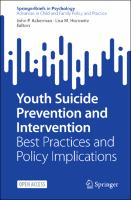Youth Suicide Prevention and Intervention
Best Practices and Policy Implications
Contributor(s)
Ackerman, John P. (editor)
Horowitz, Lisa M. (editor)
Language
EnglishAbstract
This open access book focuses on the public health crisis of youth suicide and provides a review of current research and prevention practices. It addresses important topics, including suicide epidemiology, suicide risk detection in school and medical settings, critical cultural considerations, and approaches to lethal means safety. This book offers cutting-edge research on emerging discoveries in the neurobiology of suicide, psychopharmacology, and machine learning. It focuses on upstream suicide prevention research methods and details how cost-effective approaches can mitigate youth suicide risk when implemented at a universal level. Chapters discuss critical areas for future research, including how to evaluate the effectiveness of suicide prevention and intervention efforts, increase access to mental health care, and overcome systemic barriers that undermine generalizability of prevention strategies. Finally, this book highlights what is currently working well in youth suicide prevention and, just as important, which areas require more attention and support. Key topics include: The neurobiology of suicide in at-risk children and adolescents. The role of machine learning in youth suicide prevention. Suicide prevention, intervention, and postvention in schools. Suicide risk screening and assessment in medical settings. Culturally informed risk assessment and suicide prevention efforts with minority youth. School mental health partnerships and telehealth models of care in rural communities. Suicide and self-harm prevention and interventions for LGBTQ+ youth. Risk factors associated with suicidal behavior in Black youth. Preventing suicide in youth with autism spectrum disorder (ASD) and intellectual disability (ID). Youth Suicide Prevention and Intervention is a must-have resource for policy makers and related professionals, graduate students, and researchers in child and school psychology, family studies, public health, social work, law/criminal justice, sociology, and all related disciplines.
Keywords
Autism, intellectual disability, youth suicide risk; Cultural considerations, youth suicide assessment; Demographics, risk factors, youth suicide; Depression, suicidal ideation in adolescents; Ethnic, gender, sexual minority youth and suicide risk; Hospital-school-community partnerships, youth suicide; LGBTQ+ youth and suicide prevention; Machine learning, youth suicide prevention; Medical settings, primary care, youth suicide; Minority youth, discrimination, trauma, suicide risk; Neurobiology, suicide, children and adolescents; Pharmacology, suicide interventions, youth; Protective factors, youth, suicide prevention; Rural communities, youth suicide; School mental health, youth suicide risk; School-based suicide prevention programs; Suicidal behavior, youth, epidemiology; Suicide bereavement, social networks, adolescence; Youth suicide prevention and interventionDOI
10.1007/978-3-031-06127-1ISBN
9783031061271, 9783031061271Publisher
Springer NaturePublisher website
https://www.springernature.com/gp/products/booksPublication date and place
Cham, 2022Grantor
Imprint
Springer International PublishingSeries
SpringerBriefs in Psychology; Advances in Child and Family Policy and Practice,Classification
Child, developmental and lifespan psychology
Central / national / federal government policies
Psychiatry
Public health and preventive medicine
Clinical psychology


 Download
Download Web Shop
Web Shop